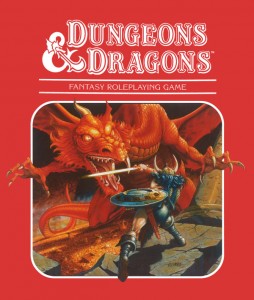Dungeons and Dragons Takes Its Place as an Undisputed Culture Piece
Everyone fortunate enough to have toys had their favorites growing up. Some inspired creativity, some intelligence, but all toys inspired fun and imagination. Since 1999, The Strong National Museum of Play has inducted toys and games into its Toys Hall of Fame. This year is no exception, as pointed out by Fisher-Price’s Little People figures, the classic swing, and the cultural phenomenon that is Dungeons and Dragons, joining already announced entrants the Atari 2600, Frisbees, and the cardboard box. Dungeons and Dragons was created in 1974 by Gary Gygax, and is a fantasy game using dice and character sheets in combination with published books to create a role-playing experience. It not really surprising that Dungeons and Dragons is going in to this Hall of Fame, in fact it has a leg up of many of its fellow toys in that the game is still played today, often being updated and refined, but never truly removing the core experience. Many of the current and past generation look at D&D as a landmark game, yet very few seem to remember the struggle it went through to be accepted, with Christian groups demonizing the game for well, leading to devil-worship and increased practice of the occult. This of course, has never been proven despite the mass media’s attempts to draw people away from the game it instead drew them in. Years later, journalists and news media outlets who don’t understand gaming still try to label things like D&D as something for nerds who live in their parents’ basement, fat losers incapable of socializing. Yet, just like with video games, I would argue that the media fails to see how games bring people together, allowing them to share in a common bond. Its not weird or wrong it’s just different than what previous generation grew up on. One could make the same argument for people (mostly of the older variety) that don’t embrace smartphones, computers, or the internet, it is hard to understand something you didn’t grow up with or isn’t something you commit so much time to it becomes part of your very soul. I fell the media has gotten better at accepting hobbies like D&D as commonplace, but it still lacks enough hindsight or decency to not stereotype the players of these games in specific ways. Hopefully, an honor like this will cement Dungeons and Dragons not only as a mainstream piece of popular culture (which it is and has been for the last two decades), but give the media reason to write and talk about the game and its players with dignity and respect going forward. The time has come for the media to not classify nerds/geeks who enjoy games like D&D as socially limited losers, but rather as people with a hobby, one that has earned its place in American culture. The media will probably never all embrace it wholeheartedly, but I know some day it will expand from beyond gaming blogs and magazines, where a news personality will be allowed to discuss D&D without being labeled, even if it is just mentioned as a specific, personal hobby, that far better than how it is portrayed now. In a world where pop culture comes and goes, Dungeons and Dragons is still relevant, still important 42 years later, and considering the subject that is worth media attention.
Image Courtesy of http://www.patheos.com

I agree that role-playing games are a great way to bring a group together to have a good time. My brother and I played D&D with a bunch of his friends while we were in high school, and it was always super fun.
I think playing role-playing games can also help improve social skills, since it’s all about communication between the game master and the players. Also, in those games the players’ choices and actions carry much more weight than in other games, which I think can help with decision-making skills as well.